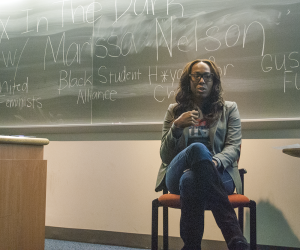
Relationship counselor Marissa Nelson spoke about healthy sexual relationships on Tuesday evening.
United Feminists, H*yas for Choice and the Black Student Alliance presented “Sex in the Dark: A Conversation on Healthy Relationships” on Tuesday evening to create a forum for students to discuss sex and relationships.
The conversation was facilitated by Marissa Nelson, a licensed marriage and family therapist specializing in individual, couples and sex therapy. Her fellow panelists were United Feminists Co-Chair Kimberly Blair (COL ’15), H*yas for Choice President Abby Grace (SFS ’16) and BSA President Shauntell Pinckney (COL ’15). The event was not affiliated with the university. The event was set up to be interactive, and participants anonymously texted questions and answered polls in real time. Nelson began the discussion by talking about her career path, hoping to help serve others.
“Being a couple’s therapist is my second field. Originally, I did do sociology undergrad and then I moved to Los Angeles and became a publicist and I really enjoyed that for a little bit, but something was missing for me,” Nelson said. “People always used to say you’re really sensitive and I didn’t think that was a bad thing. … I really wanted to go down an avenue where I would be helping and serving others.”
While doing family therapy, Nelson noticed that many of the issues of children came from unresolved problems between their parents. Her interest in couple’s therapy stemmed from there, and she began to speak with couples, which eventually led to her to begin practicing in sex therapy.
Nelson also spoke about her experiences with race and interracial couples, and said that it is problematic that she often hears from clients say, “I don’t see color.”
“I say if you don’t see color you are missing the essence of who I am,” Nelson said. “You have to be able to name it, you have to be able to express it and share it and understand each other, and sometimes you are going to have blind spots and sometimes you are not going to get it.”
As the discussion continued, the panel opened up the use of word cloud to poll the audience’s feelings about topics such as casual sex, oral sex and female sexuality. Members of the crowd could anonymously send in words or phrases that came to mind after reading the topic.
“I do think that especially at this age exploration is very important,” Nelson said. “It shapes your whole sexual identity for the rest of your life and it gives you great tools and a great way to hopefully try to communicate your needs to a partner and to try understand what it is you like about sex, what are the things you enjoy about sex and how to guide your partner through that process.”
Zoey Krulick (SFS ’15), who attended the event, said that she enjoyed learning about topics that Georgetown generally avoids when choosing speakers.
“I always love having events like this on the Georgetown campus because I feel like due to Georgetown’s Jesuit identity, we do not have a lot of events that address sex and sexuality,” Krulick said. “It was really interesting to hear the perspective of a sex therapist, and I learned a lot of cool stuff about addressing issues that may come up in a relationship.”
Blair said she enjoyed the discussion because it explored a diversity of topics.
“Nobody really gets the opportunity to talk about these intersecting issues of healthy relationships and how sex plays into those healthy relationships on campus,” Blair said. “I was really happy that we had a lot of questions that were not in the heteronormative realm because when we’ve brought in sex educators in the past there was that common critique so we really wanted to address that this time. We thought that bringing in a therapist this time would be a different take so that we as college students can understand what toll or what affects these topics have on ourselves and on our psyches.”














